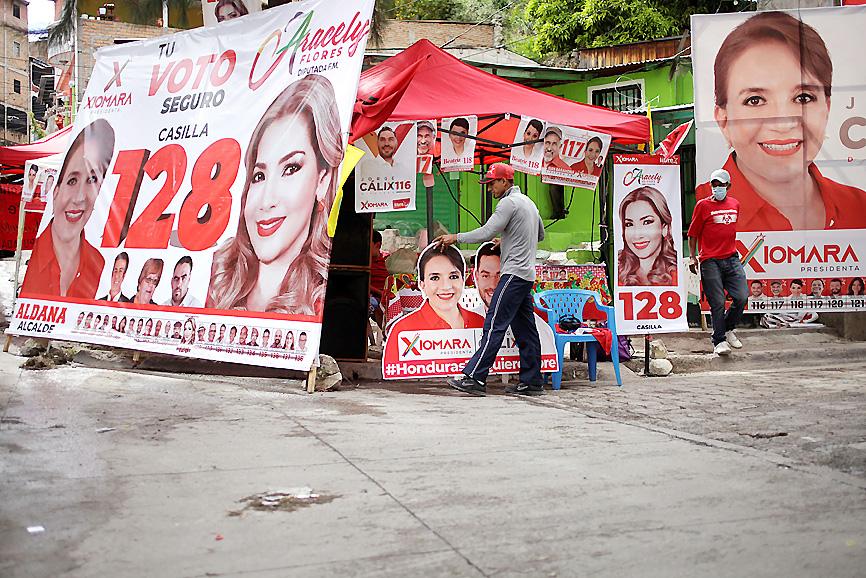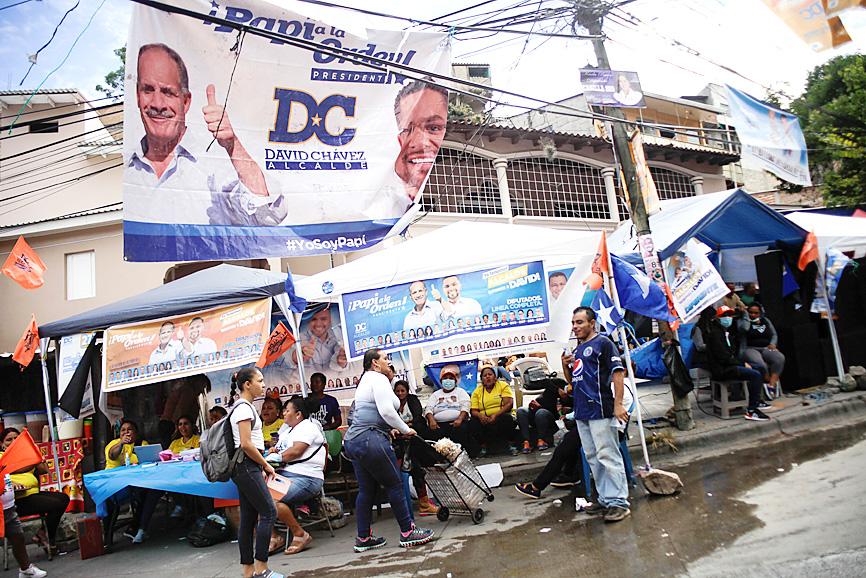Taiwan’s diplomatic ally Honduras was bracing itself for potential violence as more than 5 million people voted yesterday to replace Honduran President Juan Orlando Hernandez, a controversial figure accused of drug trafficking in the US.
Leftist opposition candidate Xiomara Castro led opinion polls last month, but the ruling right-wing National Party (PN) — whose candidate is charismatic Tegucigalpa Mayor Nasry Asfura — has had the benefit of better organization and greater resources to run its campaign.
Opposition fears of a rigged poll and reports of pre-election intimidation have led to high tensions.

Photo: Reuters
“If the PN wins the election, even legitimately, there will be a worrying level of violence,” said political analyst Raul Pineda, a lawyer and former PN lawmaker.
Four years ago, Hernandez stood for and won an unconstitutional second successive term amid cries of fraud from the opposition and international observers.
That sparked a widespread month-long protest, with the subsequent government crackdown leaving more than 30 people dead.

Photo: Reuters
“There is sufficient fuel ... for a new electoral crisis to break out,” said Eugenio Sosa, a sociology professor at the National Autonomous University of Honduras.
The concerns come for a country already ravaged by violent gangs, drug trafficking and hurricanes, in which 59 percent of the population of 10 million live in poverty.
Many are expecting the worst.
“A kind of paranoia has developed, people are preparing for war” by stocking up on food and water, Pineda said.
However, he said that pressure from Washington — which wants to reduce the triggers for Central American mass migration to the US — along with a large corps of international observers, should at least ensure a transparent vote.
Polls were to open at 7am and close at 5pm in a single round of voting.
The crucial moment when “violence could happen” would come three hours later when the National Electoral Council (CNE) is due to announce early results, Center for Democracy Studies executive director Gustavo Irias said.
“To avoid it will depend on the attitude taken by different political actors, election observers and the US embassy,” Irias said.
About 18,000 police and as many soldiers were to be on duty around the country.
The PN has been in power since Manuel Zelaya — Castro’s husband — was ousted in a 2009 coup supported by the military, business elites and the political right.
Corruption and drug-trafficking scandals have engulfed Hernandez and many of his inner circle in the past few years, including Asfura.
Asfura was last year accused of embezzling US$700,000 of public money and was also linked in the Pandora Papers to influence-peddling in Costa Rica.
The third major candidate of 13 in the presidential race, the Liberal Party’s Yani Rosenthal, spent three years in a US jail after admitting to laundering drug-trafficking money.
These scandals have played into former first lady Castro’s hands.
“People won’t vote for Xiomara, they will vote against Juan Orlando Hernandez and what he represents,” Pineda said.
Castro, of the Libre party, led some opinion polls last month by 12 to 17 percentage points.
She has said that if victorious, she would switch the Central American country’s diplomatic relations from Taipei to Beijing.
However, a close aide on Tuesday last week said that she had not made a final decision on the matter.

A car bomb killed a senior Russian general in southern Moscow yesterday morning, the latest high-profile army figure to be blown up in a blast that came just hours after Russian and Ukrainian delegates held separate talks in Miami on a plan to end the war. Kyiv has not commented on the incident, but Russian investigators said they were probing whether the blast was “linked” to “Ukrainian special forces.” The attack was similar to other assassinations of generals and pro-war figures that have either been claimed, or are widely believed to have been orchestrated, by Ukraine. Russian Lieutenant General Fanil Sarvarov, 56, head

SAFETY FIRST: Double the number of police were deployed at the Taipei Marathon, while other cities released plans to bolster public event safety Authorities across Taiwan have stepped up security measures ahead of Christmas and New Year events, following a knife and smoke bomb attack in Taipei on Friday that left four people dead and 11 injured. In a bid to prevent potential copycat incidents, police deployments have been expanded for large gatherings, transport hubs, and other crowded public spaces, according to official statements from police and city authorities. Taipei Mayor Chiang Wan-an (蔣萬安) said the city has “comprehensively raised security readiness” in crowded areas, increased police deployments with armed officers, and intensified patrols during weekends and nighttime hours. For large-scale events, security checkpoints and explosives

PUBLIC SAFETY: The premier said that security would be tightened in transport hubs, while President Lai commended the public for their bravery The government is to deploy more police, including rapid response units, in crowded public areas to ensure a swift response to any threats, President William Lai (賴清德) said yesterday after a knife attack killed three people and injured 11 in Taipei the previous day. Lai made the remarks following a briefing by the National Police Agency on the progress of the investigation, saying that the attack underscored the importance of cooperation in public security between the central and local governments. The attack unfolded in the early evening on Friday around Taipei Main Station’s M7 exit and later near the Taipei MRT’s Zhongshan

REBUFFED: In response to Chinese criticism over recent arms sales, Washington urged Beijing to engage in meaningful dialogue instead of threats and intimidation Washington’s long-term commitment to Taiwan would not change, the US Department of State said yesterday, urging Beijing to stop pressuring Taiwan and engage in meaningful bilateral dialogues. The remarks came in response to a backlash from Beijing about Washington’s latest approval of arms sales to Taiwan. The US Defense Security Cooperation Agency said in a statement on Wednesday that the Taipei Economic and Cultural Representative Office in the US has asked to purchase an arms package, including Tactical Mission Network Software; AH-1W helicopter spare and repair parts; M109A7 self-propelled howitzers; HIMARS long range precision strike systems; tube-launched, optically tracked, wire-guided missiles; Javelin